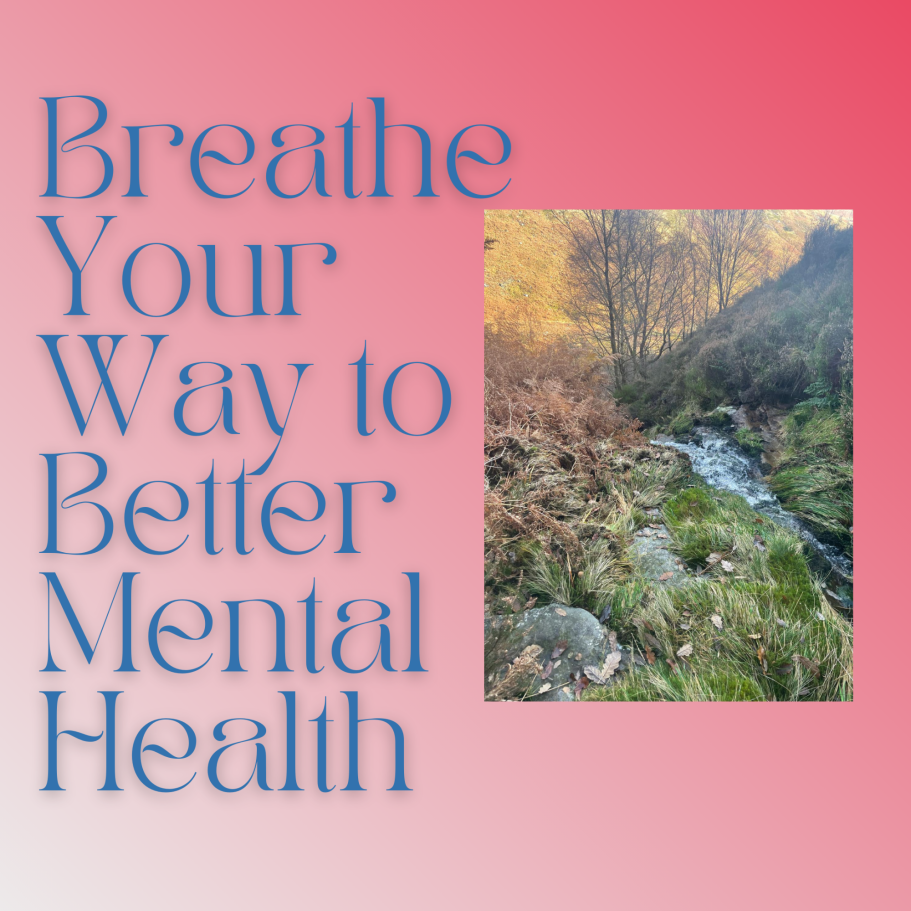Simple breathing techniques you can incorporate into your daily life.

Breathe Your Way to Better Mental Health
In recent years, mental health has become a priority topic, and as a result, practices like mindfulness and breathwork have grown in popularity. Among these practices, breathwork has emerged as a remarkably accessible tool, allowing people to manage stress, improve mood, and enhance overall mental well-being. In this blog, we’ll explore the science behind breathwork, its benefits, and simple techniques you can incorporate into your daily life for improved mental health.
What is Breathwork?
Breathwork refers to a range of breathing exercises and techniques designed to intentionally control the breath. These techniques can range from slow, controlled breathing for relaxation to deeper, rhythmic breathing for energising the body and mind. Breathwork is often found in meditation and yoga practices, but it also stands alone as a powerful tool for stress management and mental health.
The Science of Breathwork and Mental Health
Our bodies are hardwired to respond to stress, an ancient survival mechanism known as the "fight-or-flight" response. When we encounter stress, our sympathetic nervous system activates, causing faster breathing, increased heart rate, and heightened alertness. While helpful in genuine emergencies, chronic stress leads to prolonged activation of this response, which can contribute to anxiety, depression, and other mental health issues.
Breathwork helps to activate the parasympathetic nervous system, often called the "rest-and-digest" system. Slow, deep breathing signals the brain that it's safe, reducing the production of stress hormones like cortisol and encouraging a sense of calm. Over time, regular breathwork practice can train the brain to better manage stress, reducing its negative impact on mental health.
Benefits of Breathwork for Mental Health
- Reduces Anxiety and Stress
Controlled breathing exercises can reduce stress by promoting relaxation and helping individuals disengage from negative thoughts. When practised regularly, breathwork can build resilience, making it easier to stay calm during life’s challenges. - Improves Focus and Clarity
Breathwork brings attention to the present moment, which can help to clear mental fog and improve focus. By anchoring ourselves in the breath, we become less distracted by worries or intrusive thoughts. This can be especially helpful for those who struggle with concentration or experience frequent stress at work or school. - Enhances Emotional Regulation
Breathwork helps regulate emotions by creating a pause between a trigger and the reaction. When we become accustomed to using breathing techniques, we can respond to emotional situations with greater calmness and control. - Improves Sleep Quality
Poor sleep and mental health issues often go hand-in-hand. Breathwork before bed can improve sleep quality by calming the nervous system and reducing restlessness. Studies have shown that those who practise mindful breathing techniques often fall asleep faster and experience more restful sleep. - Supports Mind-Body Connection
Breathwork fosters a deeper awareness of the body, enhancing the mind-body connection and promoting holistic well-being. By drawing our focus inward, we can become more attuned to both physical and emotional needs, making it easier to address and resolve stressors.
Popular Breathwork Techniques for Mental Health
If you’re new to breathwork, here are a few techniques to start with. These practices are easy to learn and can be done anytime, anywhere.
Box Breathing (Square Breathing)
This technique involves inhaling, holding, exhaling, and holding again—all for an equal count, often four seconds. Box breathing is popular among athletes and even in high-stress professions like the military because of its calming effects on the mind and body.
How to practise:
- Inhale through the nose for a count of 4.
- Hold your breath for a count of 4.
- Exhale slowly for a count of 4.
- Hold the empty breath for a count of 4.
- Repeat for several cycles, adjusting the count if necessary.
Diaphragmatic (Belly) Breathing
Diaphragmatic breathing, or belly breathing, focuses on engaging the diaphragm for deeper breathing, often used to relieve stress and anxiety.
How to practise:
- Place one hand on your chest and the other on your belly.
- Inhale deeply through the nose, allowing the belly to expand as you fill the lungs.
- Exhale slowly through the mouth, feeling the belly fall.
- Repeat for several minutes, focusing on the rise and fall of the belly.
4-7-8 Breathing
Created by Dr. Andrew Weil, this technique is effective for calming the nervous system and reducing anxiety.
How to practise:
- Inhale quietly through your nose for a count of 4.
- Hold your breath for a count of 7.
- Exhale completely through the mouth for a count of 8.
- Repeat for up to four cycles.
Alternate Nostril Breathing (Nadi Shodhana)
Known for balancing the mind and body, alternate nostril breathing is commonly used in yoga and meditation practices.
How to practise:
- Close your right nostril with your right thumb and inhale through the left nostril.
- Close your left nostril with your ring finger, then exhale through the right nostril.
- Inhale through the right nostril, then close it and exhale through the left.
- Repeat this cycle several times, keeping the breath slow and steady.
Integrating Breathwork into Your Routine
Starting a breathwork practice doesn’t require any special equipment or training, making it easy to integrate into your day. You can practise a few minutes in the morning to set a calm tone for the day, or use it before a challenging situation to reduce stress. Even just a few deep breaths during a break can bring clarity and help reset your focus.
Final Thoughts: Embracing Breathwork for a Healthier Mind
In our fast-paced world, the importance of taking time for mental health can’t be overstated. Breathwork provides an effective, accessible, and science-backed way to reduce stress, improve focus, and enhance emotional regulation. By dedicating just a few minutes each day to mindful breathing, you can cultivate a habit that brings balance, peace, and resilience to every area of your life.
Whether you’re new to breathwork or have been practising for years, remember that consistency is key. Over time, you’ll likely notice a greater sense of calm, focus, and well-being—a powerful testament to the transformative power of simply breathing with intention.
We need your consent to load the translations
We use a third-party service to translate the website content that may collect data about your activity. Please review the details in the privacy policy and accept the service to view the translations.

